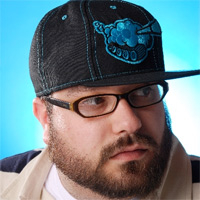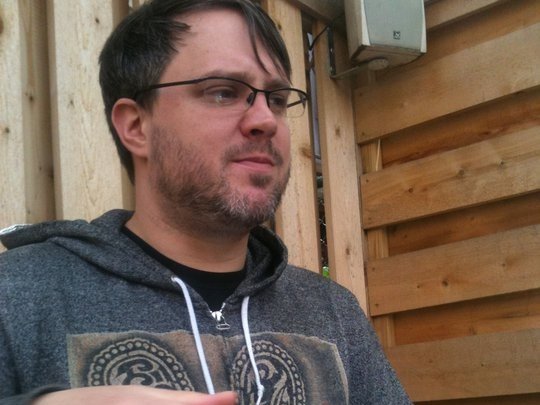Underneath the surface of sound, the Milwaukee electronic music scene is bubbling and growing, waiting to burst beyond the circles that currently embrace them.
Talented musicians are taking their musical sensibilities learned from playing instruments, or studying music in some fashion, and are plugging themselves into computers to continue their development of sound.
Some of its critics call computer-based music the lazy way to create and very soulless. Proponents of computer-based music scoff at that and the limitations of only being able to utilize one instrument's sound, as they have the entire catalogue of instrumentation open to them and their tinkering ways.
One of Milwaukee's electronic artists is Barry "adoptahighway" Clark, who has recently released a split EP called "Terrorvision" with another artist by the name of Sleetwalker on the Philadelphia-based Ill Pill Records.
Clark is a producer that is heavily involved in creating music as both a solo artist and as a member of other groups and collectives, most notably being his collaboration with Lorn called Omega Clash. The man who goes by adoptahighway can create tapestries ranging from the most glitchy computer music to smooth tunes that feel like real instrumentation was used instead of a vast sound bank on a hard drive.
On the "Terrorvision" EP, Clark's side features two songs that are dynamically different from each other while still showcasing his ability to move the music along without it growing boring, as any good composer can do.
Before the vinyl release party of "Terrorvision" takes place at Club Garibaldi on Feb. 23, adoptahighway talked with OnMilwaukee.com about the new project, the bias some "traditional" musicians have against computer musicians and how he actually creates the complex sounds and songs he produces.
OnMilwaukee.com: How did you get hooked up with Sleetwalker to release the "Terrorvision" EP?
Barry Clark: Sleetwalker initially approached me in September with an email that simply asked if I wanted to release something on his label, Ill Pill Records. Literally, that's all it said, which I thought was kind of funny because I couldn't tell if this dude was serious or not. After I responded asking for a few more details he started shooting some ideas my way. He already has his "Terrorvision Theme" composed at this point and he sort of used it as a selling point for getting me to jump on board forthe record. Once I heard it, it was not a difficult decision to want to get involved. He's a very talented producer and I was humbled that he wanted me to join in on the release. We brainstormed back and forth via email for a bit before we finally decided to release "Terrorvision" in the form it is available now.
OMC: When you sit down to start composing a track, where do you start? Are you the type that hears certain sounds or melodies in your head and then goes to the machines or do you tinker until you strike gold?
BC: I'm very much the type of musician that hears a melody and/or bass line long before I have the opportunity to record it. I attribute this attitude of approaching composition to my classical training. I was trained while studying for my undergraduate in music performance to be able to hear melodies and know what notes they correspond with on the keyboard. So, when I do sit down ready to compose a track, I can hear the melody I've created in my head and lay it down within the production session. Bass lines are soon to follow, or may even be the first thing I record into a track. Once I have this sort of ground work laid out, I can begin to hear the rhythmic and drum patterns that I want to express, as well as various harmonies and chords I would like to include.
I know many electronic musical peers who always lay down a solid rhythmic pattern or drum beat before they even begin to touch melodies or lead synth lines. I'm quite the opposite. There's really no right or wrong way when it comes to electronic music composition, though. If you find a route that you're most comfortable with and that can most accurately express your musical ideas, then that's what you should do.
OMC: Dave Grohl of the rock band Foo Fighters seemed to have a little rant against electronic music in his Grammy acceptance speech. Does electronic music, after decades of popularity around the world, still face close-minded snubs like this on the regular?
BC: Yes, which is unfortunate. It comes down to keeping an open mind and not sheltering yourself within the constraints of what you think music can and cannot be. I compare the music that is being created with computers to instruments and practices that have been around for decades, even centuries. For example, when you hear a Beethoven symphony side-by-side with a Shostakovich symphony, they are glaringly different works of music but the same instruments were being used within the works. There was, however, harsh criticism of the new music that was being created between those two composers' time periods. By the time we reached the early 20th century, a majority of critics pined for the return of more "traditional" music. Then comes the electric guitar. Remember how many critics and fans threw a damn fit when Bob Dylan plugged in an electric guitar? Some people are afraid of change, threatened by things outside of their comfort zone. This criticism of computer music, it's all really ridiculous. The computer is just another instrument that is still in its infancy, relatively speaking. Only time can tell whether or not the computer as a musical instrument will last, but in my lifetime computer music has been an inspiring genre, and as long as musicians keep an open mind to its capabilities they'll realize its critical and positive impact on the progression of music as a whole.
OMC: When you do a live show, what kind of show do you bring to the crowd?
BC: I try to put on a performance that will be remembered. I hope that the performance of my music will at least turn heads, if not have them nodding. I put an incredible amount of emotion into the music I write, so I obviously put a lot of emotion into my performance. Sometimes I'll just come up with lyrical content I've been churning in my head for days, find a melody I can stick it to, and just belt it out at the top of my lungs. I like to keep my sets quasi-improvised as well. I have all my parts laid out in a rough blueprint, but I enjoy going off the cuff and improvising, seeing what comes out of it and where I land when it's all said and done.
OMC: You have two cuts on the split EP, one that is a bit more intense and one that is much more relaxed. Both tracks have movements within them so they're not just a boring loop. Why was it important to you to showcase the both the harder and softer sides of what you do?
BC: I didn't really pay too much thought to the idea that one was more intense or relaxed than the other. "No Heat on the Riverbank" was actually a tune I had initially composed back in late 2009. I tinkered around with it for a while, couldn't really find an output/release for it, but once the "Terrorvision" project came up I knew I had a proper home for it. "Color of Conductivity" was a brand new tune written specifically for this EP. Both tunes have a theme of temperature and the emotions that coincide with the effects of heat/cold. I never approach composition with thinking about how "hard" or "soft" I want something to be. I have an idea or a concept, and I try to compose to express it as accurately I can, in hopes that my music can be connected to by the listeners.
OMC: You are a guy that always has stuff in the works. What else do you have in the pipes?
BC: Currently I'm riding the wave of the "Terrorvision" vinyl release, promoting hard and trying to turn some heads. I'm working on more original music, hoping to strike while the iron is hot and release a fresh adoptahighway vinyl this summer. I've been tinkering around with a few remixes for fellow Wisconsin electronic musicians Man Mantis and Chants, both Madison based. I'm also working on some collaborative original music with a singer/songwriter from Belgium by the name Tomas Verheyen, who goes by Hear, hear! (a cheer). And, of course, my collaborative project with my longtime friend Lorn, Omega Clash, is always bubbling underneath the surface. We're stewing on a number of tunes right now and hopefully once the time is right, and our calendars sync up, we'll be able to release the beast on our artistic collective, Wednesday Sound.
Born in Milwaukee and raised in the Milwaukee suburb of Brown Deer, Concordia University Wisconsin alumnus Poppe has spent the majority of his life in or around the city and county of Milwaukee.
As an advocate of Milwaukee's hip-hop community Poppe began popular local music blog Milwaukee UP in March 2010. Check out the archived entries here.
Though heavy on the hip-hop, Poppe writes about other genres of music and occasionally about food, culture or sports, and is always ready to show his pride in Milwaukee and Wisconsin.







